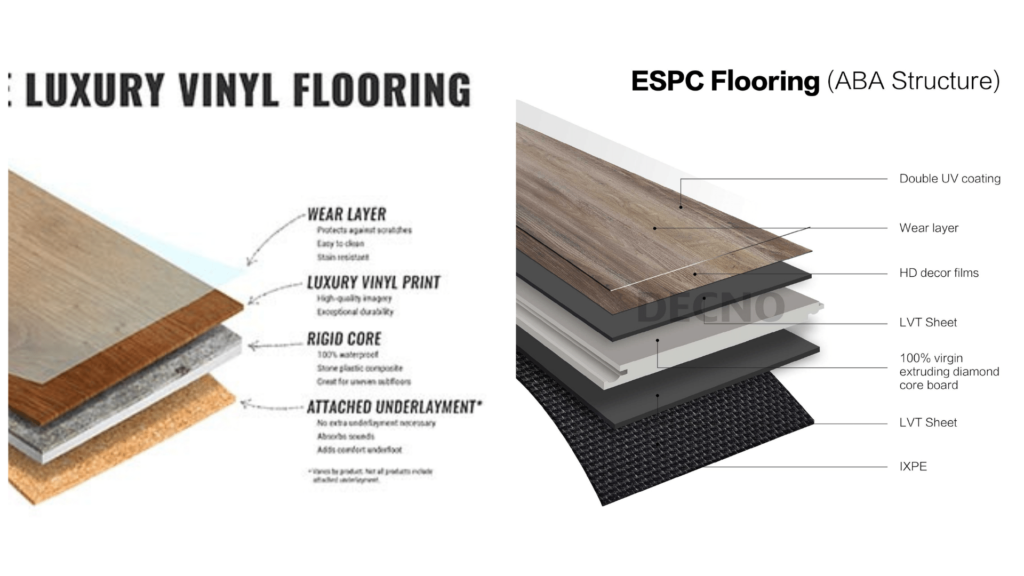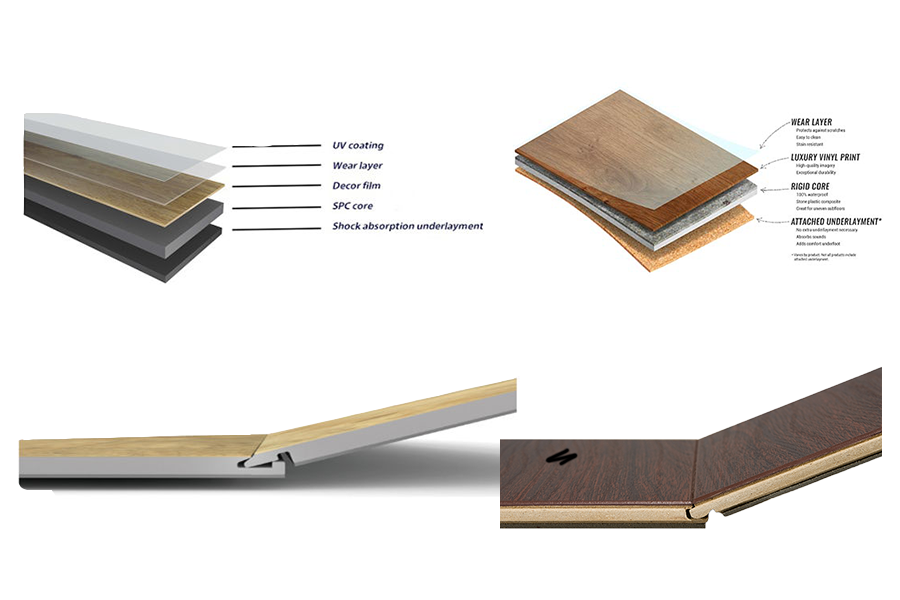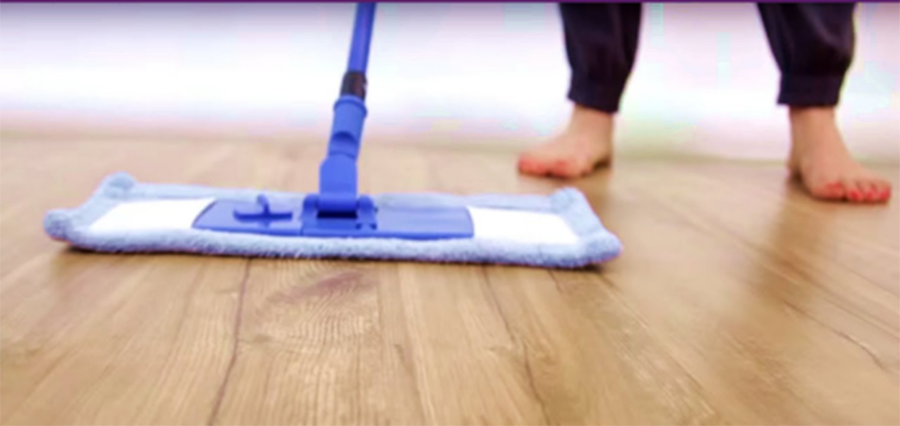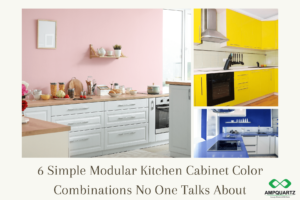At first glance, laminate and SPC flooring can appear nearly identical. This resemblance often leads to confusion, with some mistakenly believing them to be the same product. But beneath the surface lie significant differences that impact their performance and suitability for your home. Let's delve deeper and uncover the key distinctions between SPC and laminate flooring.
Differences between SPC Flooring & Laminate Flooring #1: Core Material

Beyond the Surface: Unveiling the Core Differences Between SPC and Laminate Flooring
While laminate and SPC flooring may look similar on the surface, a crucial distinction lies beneath: the core material. Both consist of four layers generally: a backing layer, core, printed design layer, and a wear layer.
Laminate's Core: Potential Weaknesses
Laminate flooring utilizes a core made of compressed wood fiber, also known as HDF (High-Density Fiberboard). This material offers affordability but can be susceptible to moisture damage. Over time, laminate floors with HDF cores may be vulnerable to warping, mold, and even mildew growth, similar to traditional wood flooring.
SPC's Core: Strength and Water Resistance
SPC flooring, on the other hand, boasts a core constructed from solid SPC (Stone Plastic Composite). This innovative material packs a punch in terms of durability. Its high density makes it ideal for withstanding heavy foot traffic and everyday wear. More importantly, SPC's core is inherently water-resistant, eliminating concerns about warping or moisture damage.
The Core Takeaway
Understanding the core material distinction is key to choosing the right flooring for your needs. While laminate offers a budget-friendly option, its susceptibility to moisture might be a concern for high-traffic or water-prone areas. SPC flooring, with its water-resistant and durable core, provides a strong alternative for long-lasting performance.
Differences between SPC Flooring & Laminate Flooring #2: Waterproof

Credit: Trade X
Water Woes? Choosing the Right Flooring for Your Needs
Waterproofing is a crucial factor when selecting flooring, especially for areas prone to moisture. Here's how laminate and SPC flooring stack up:
Laminate Flooring: Not a Champion Against Water. Laminate flooring has limited water resistance. While it may handle occasional spills, it's not suitable for high-moisture areas like bathrooms or laundry rooms. Exposure to excess water can cause warping and damage.
SPC Flooring: A Water-Resistant Warrior. SPC flooring shines in terms of water resistance. Its core is designed to withstand moisture, making it a great choice for kitchens, bathrooms, and even basements. However, a caveat: quality matters. While high-quality SPC flooring effectively repels water, poorly installed or low-grade options might not. These can trap moisture, leading to odor and mold growth.
Choosing Wisely: Prioritize Quality and Installation
When considering SPC flooring, prioritize both quality materials and proper installation. Look for SPC with a proven water resistance rating and choose a reputable installer to ensure a watertight seal.
Differences between SPC Flooring & Laminate Flooring #3: Thickness

Flooring thickness plays a role in both aesthetics and durability. Let's explore the differences between laminate and SPC flooring in this regard:
- Laminate Flooring: A Balance of Strength and Style
Laminate flooring typically ranges in thickness from 6mm to 12mm. This thicker profile is due to its layered construction, which often includes a core made of high-density fiberboard. While adding some bulk, this structure contributes to laminate's overall strength and stability.
- SPC Flooring: Slim Profile, Big Performance
SPC flooring offers a noticeably slimmer profile, with thicknesses ranging from a mere 1.5mm to a maximum of 5mm. This is because SPC planks utilize a solid core made of stone plastic composite, a high-density material known for its durability. Despite its thinness, SPC flooring can be surprisingly resilient, especially when opting for thicker options with a robust wear layer.
Choosing the Right Thickness
While laminate's thickness might suggest greater overall strength, it's important to consider your specific needs. In high-traffic areas, a thicker laminate might be preferable. However, SPC flooring's thinner profile can create a more modern look and still provide excellent durability, especially in thicker versions.
The Takeaway: Thickness is Just One Piece of the Puzzle
Ultimately, the ideal thickness depends on your priorities. Laminate offers a thicker, potentially more stable option, while SPC provides a sleek profile with impressive durability in its own right. Consider both thickness and your desired aesthetic and functionality when making your choice.
Differences between SPC Flooring & Laminate Flooring #4: Installation
Laminate Flooring: Easy Clicks, Potential Leaks
Laminate flooring often features a convenient click-and-lock system, allowing for a seemingly straightforward installation. However, achieving a perfect fit is crucial. Gaps or poorly locked edges can become vulnerable spots, allowing moisture to seep in and damage the core material.
To ensure a watertight fit, some laminate installations might require professional equipment like a circular saw with a specific blade for precise cuts.
SPC Flooring: Options for All Skill Levels
SPC flooring offers installation options for both experienced and novice DIYers. Click-and-lock systems similar to laminate exist, but some sheet SPC flooring might require spreading glue evenly and cutting the sheets to size, demanding slightly more skill.
The Verdict: Consider Your Skills and Needs
Both laminate and SPC flooring cater to DIY enthusiasts, but their installation complexities differ. Laminate's click-and-lock system might seem easier, but achieving a perfect fit is essential to prevent water damage. SPC, while offering click-lock options, might require additional skills for sheet installations.
Differences between SPC Flooring & Laminate Flooring 5: Flooring Maintenance & Cleaning

Keeping Your Floors Spotless: Laminate vs. SPC Flooring Care
Maintaining beautiful floors is essential for any home. Here's a breakdown of cleaning and maintenance considerations for laminate and SPC flooring:
Laminate Flooring: Keeping it Dry is Key
While laminate boasts a relatively simple cleaning routine – regular sweeping and occasional damp mopping – maintaining its longevity requires caution. Laminate is moisture-sensitive, so avoid excessive water exposure. Ditch the wet mop and opt for a damp microfiber cloth for cleaning. Spills should be addressed promptly to prevent water from seeping into the seams and damaging the core.
SPC Flooring: Water-Resistant Warrior, But Not Invincible
SPC flooring shines when it comes to cleaning. Regular sweeping and damp mopping are all you need to keep it looking its best. However, its water resistance has limitations. Avoid flooding the floor with water or using a steam mop. Standing liquids can still penetrate through seams and cause damage.
Beyond Cleaning: Maintaining the Beauty of Both
For both laminate and SPC flooring, long-term beauty requires vigilance beyond cleaning:
- Fight the Fade: Both flooring types can be susceptible to fading from UV rays. Consider strategic furniture placement to minimize direct sunlight exposure.
- Beware of Stains: Address spills promptly to prevent permanent marks. Use cleaning solutions specifically designed for your flooring type.
- Mind the Heat: Avoid placing extremely hot objects directly on either laminate or SPC flooring, as heat can cause warping or discoloration.
The Takeaway: Cleanliness and Care for Lasting Beauty
While laminate and SPC flooring offer different levels of water resistance, both require proper cleaning and maintenance for optimal performance. Regular sweeping, damp mopping (with caution for laminate), and addressing spills quickly are key practices. By following these tips and being mindful of UV light, stains, and heat, you can ensure your floors stay beautiful for years to come.
Too Many Choice and No Idea?
Ampquartz has been in the industry since 2008 with 10 years of experience in the realm of natural & man-made stones & kitchens in Johor Bahru. Our objective is to grow internationally to cater to the different market segments. We believe in treating all our clients with excellent service and 100% dedication. We are well known for providing tip-top service, experience, and knowledge to our customers.
The SPC vs. Laminate Showdown: Choosing the Right Floor for Your Needs
Picking the perfect flooring can be overwhelming, but understanding the key differences between SPC and laminate can simplify your decision. Let's break down the crucial factors:
Core Strength and Water Resistance:
- Laminate: Uses compressed wood fiber, making it susceptible to moisture damage and potential mold growth. It's best suited for low-moisture areas like living rooms and bedrooms.
- SPC: Boasts a solid, water-resistant SPC core. This translates to excellent durability and makes it a perfect choice for high-traffic areas, kitchens, and even bathrooms.
Thickness and Installation:
- Laminate: Typically comes in a thicker profile (6mm-12mm) due to its layered structure. Often features a convenient click-and-lock installation system.
- SPC: Offers a slimmer profile (1.5mm-5mm) thanks to its dense core. Installation can be click-and-lock similar to laminate, but some sheet SPC options require gluing and cutting, demanding slightly more skill.
Maintenance:
- Laminate: Requires a dry cleaning approach. Avoid excessive water exposure and mop spills promptly to prevent moisture damage.
- SPC: Easier to maintain – regular sweeping and damp mopping suffice. However, avoid flooding the floor or using steam mops, as water can still penetrate seams.
The Takeaway: Choose Based on Your Needs
- For budget-friendly options in low-moisture areas, laminate might be suitable.
- If water resistance and durability are priorities, especially for kitchens and bathrooms, SPC is the clear winner.
- Consider your DIY skills: laminate's click-and-lock might be easier, but SPC offers options for both novice and experienced installers.
In Conclusion:
By understanding these key distinctions, you can confidently choose the flooring that best suits your lifestyle, budget, and desired level of water resistance. Both SPC and laminate offer unique advantages, so prioritize your needs for a happy and beautiful flooring choice!







